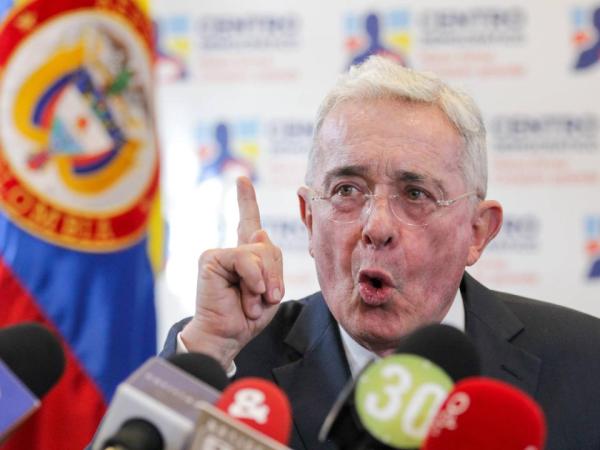On August 7, 2002, Álvaro Uribe Vélez took office as president. It has been a little over two decades now. Today, he remains an active and current political leader, polemical and controversial, who arouses passionate reactions among followers and detractors. The haze of discussions and interpretations of his role in Colombian politics seems to blur what his management as president was.
(Further: Mancuso’s response to Uribe over rumors of a plot against the former president).
When he became president, those who are thirty-five today were barely eleven years old then.. Currently, there are more than sixteen million people who were born after his term ended in 2010. And amidst the noise and prejudices, little has been said with any calm or rigor about his government.
This week, a text covering his two terms in office, 2002 and 2006, appeared in bookstores. It was written by a dozen authors, including myself, with valuable support from Professor Jorge Giraldo as editor: “Uribe, looks at his government from two decades away”, published by Arie and the University of the Andes.
It is not common to write biographies of heads of state in Colombia. Only a couple have been published about Barco and one earlier by Lleras Camargo. There are also few books about the governments or the presidents. Something has been done about López Pumarejo, Barco and Belisario, trying to gather aspects of their policies and their management. And in general, rhetoric and commonplaces abound in the retrospective look at public conversations and discussions.
(Read: ‘Poor people will pay the rich for their appreciation’: Petro reacts to Uribe’s proposal).
This work seeks to fill one of those gaps, for the period of Álvaro Uribe. It also aims to make a non-passionate analysis, somewhat refined, if you will, with the perspective that the years give, of his main policies and his style of governing.
The challenge is not minor, because many of those who wrote some of the chapters were part of the administration. But also because writing about the management of a president who is still alive, and who is still part of current political activism, has its drawbacks. Even so, we thought it was worth trying. And that there was value in doing that exercise for Promote a less contaminated reading and perspectivefor the benefit of those who wish to review or revise what were the main axes of public policy in those years.
Alvaro Uribe
The book contains texts that explain the context prior to the start of the government, the main aspects of security policy, the economic agenda and fiscal management, foreign policy, reform of official entities and social policy. It also includes a chapter on Uribe’s leadership style.
The technical rigor of writings such as those by Carlos Caballero Argaez or Alberto Carrasquilla, on economic and fiscal issues, is mixed with more anecdotal and revealing approaches such as those by Luis Alberto Moreno and Julio Londoño Paredes, on relations with Bush, Castro and Chávez. Along with them, there are chapters by Fernando Cepeda, Santiago Montenegro, Eduardo Pizarro and other authors. One of that list is that of Roberto Junguito, which he had written, but which he did not get to see published, due to his death at the end of 2020. Junguito was enthusiastic about the idea of publishing the book.
(See: Duque comes to Uribe’s defense and responds to Santos: ‘A liar falls faster…’).
Those of us who lived through those years in the early 2000s do not forget that the country was going through a dramatic situation. Some people abroad saw us as a failed state. In Colombia, the peace process with the FARC had strengthened the insurgency; thousands of kidnappings a year, the main capitals under siege; large territories controlled by paramilitaries and guerrillas; the state was weak and absent, and Colombians were intimidated; unemployment was above 17%; foreign investment was fearful; many social indicators had deteriorated.
And in this context, Uribe won the presidency, after a campaign carried out from the periphery, in the regions, by sheer effort, without the support of the parties, seeking to win over the popular bases. The government coalition came later, when its political viability and popular support became evident.
Uribe wins the presidency, after a campaign carried out from the periphery, in the regions, by sheer effort, without the support of the parties
His style was unusual. He worked frantically, was constantly present in the regions, and was obsessed with details and results. His critics spoke of micromanagement and institutional fracture. He intended to make a difference, to change the course of the situation.. The reforms to public entities were taken seriously. The book contains significant details such as what was done with Ecopetrol, by regaining its governability, separating its role in defining oil policy, by creating the ANH, and listing it on the public stock market. And something similar with Telecom and another group of entities.
It is interesting to note the continuity of his ministers over the eight years of government. In the education portfolio, a good part of the results in coverage and quality were achieved due to the permanence of Cecilia María Vélez as a minister, with very relevant experience in previous years as secretary of education in Bogotá.
(Further: Petro and Uribe exchange messages on the minimum wage and labor reform).
There were some flaws, and not minor ones. The book also covers the shadows and pending issues in some of the central issues of management. And in that, perhaps we fell short.
I remember that once in Washington in June 2002, when Uribe was already president-elect, I visited César Gaviria, who was serving as secretary general of the OAS, and I asked him how he thought Uribe would fare. He answered without hesitation: “Uribe will do well, because he does his homework””.
Professor Malcolm Deas once said that “Uribe likes to govern”, alluding to the comparison with other heads of state in Colombia. Perhaps this book will be useful to look at those years in perspective, as well as our history of the last two decades.
Jaime Bermudez Merizalde
Former Foreign Minister of the Republic
















